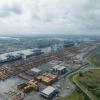News
Displaying Results 26 - 50 of 103
Policy solutions for pressing problems like air pollution require sound data. Emission inventories can help in determining the major sources of air pollution in a given country.
As a result of integrated air pollution management strategies developed under the UNECE Convention on Long-range…
Understanding how pollutant emissions will evolve in the future is essential for designing effective clean air policies today while taking into account the available resources in a given country.
While air quality in the UNECE region has improved over the past few decades as a result of…
The ongoing repercussions of the COVID-19 pandemic, geopolitical instability, and elevated inflation rates continue to pose challenges to global trade, with the World Trade Organization (WTO)'s trade growth forecast now estimated at only 0.8% this year.
As the global trade landscape grapples…
Sound emission inventories are the first step for designing effective clean air policies as they provide information about the main sources and the most acute air pollution problems in a country.
Under the Convention on Long-range Transboundary Air Pollution (Air Convention), UNECE has therefore…
Taking up some of the main results of the recent review report, which assessed the effectiveness of the amended Protocol to Abate Acidification, Eutrophication and Ground-Level Ozone (Gothenburg Protocol) under the UNECE Convention on Long-range Transboundary Air Pollution, experts discussed…
The building industry currently accounts for 39% of global energy-related CO2 emissions, 11% of which result from manufacturing building materials and products such as steel, cement, and glass. And yet, to date, emission reduction efforts have not really focused on decarbonizing the construction…
The results of the recent review report, which assessed the effectiveness of the amended Protocol to Abate Acidification, Eutrophication and Ground-Level Ozone (Gothenburg Protocol) under the UNECE Convention on Long-range Transboundary Air Pollution, have triggered further discussions among…
Breathing clean air is a necessity for everyone and decent air quality is a shared responsibility that can only be achieved if we work together. This is what Member States in the UNECE region realized 45 years ago, when they started negotiating the first multilateral, legally binding treaty to cut…
In today's data-driven world, organizations face the challenge of efficiently integrating and making sense of vast amounts of diverse data. Semantics and semantic interoperability provide a solution by enabling the meaningful interpretation and integration of data across heterogeneous systems. To…
The public and civil society have a crucial role to play in tackling key environmental challenges. To make the most of this potential, continued efforts are needed to uphold their rights to shape environmental decision-making.
To this end, the Working Group of the Parties to the Convention on…
As one of the United Nations regional economic commissions, UNECE has a key role to play in helping countries with economies in transition to better integrate into the global economy. UNECE is at the forefront of setting international standards on cross-border procedures, identifying regulatory and…
For some time now, Uzbekistan has been engaged in various activities under the UNECE Convention on Access to Information, Public Participation in Decision-making and Access to Justice in Environmental Matters (Aarhus Convention).
An international round table entitled “Aarhus Convention: Effective…
As the global economy emerges from the COVID-19 pandemic and governments strengthen efforts to “build-back-better”, trade as an engine of growth has re-emerged in policy agendas. For developing countries and countries with economies in transition that are still in the process of accession to the…
In light of today’s triple planetary crisis, one challenge for governments is to ensure that growth goes hand in hand with the development of green, inclusive and prosperous societies. This is even more challenging in today’s rapidly evolving global economy, which requires agile, flexible economies…
To address the conclusions of the review of the amended Protocol to Abate Acidification, Eutrophication and Ground-Level Ozone (Gothenburg Protocol), as adopted by the Executive Body to the UNECE Convention on Long-range Transboundary Air Pollution in December 2022, further work is currently being…
In the world grappling with the triple crisis, encompassing the COVID-19 pandemic, ongoing regional conflicts, and climate change, disruptions of global supply chains are becoming more evident, resulting in the global trade slowdown. More specifically, these challenges have led to a significant…
Research on and monitoring of the effects of air pollution on different environmental media and health has been carried out for more than four decades under the UNECE Convention on Long-range Transboundary Air Pollution. The data and research that has emerged from these efforts is unique as it…
Air pollutants are not only harming human health and the environment but are also degrading surfaces of historical buildings and monuments. Corrosion and soiling of cultural heritage sites as a result of air pollution can lead to severe economic losses as a result of high maintenance and…
Countries are increasingly facing multiple interlinked environmental, social, economic and health challenges – climate change, pollution from chemicals and wastes, biodiversity loss and species extinction, deforestation, land degradation, emerging zoonotic diseases, and the impact of armed…
The massive use of fertilizers and the production and use of manure in agriculture over the past 100 years have led to significant reactive nitrogen emissions to air and releases to water and land. Burning of fossil fuels (in vehicles, power plants and industry) is another source of reactive…
Picture your favorite tree-lined street or childhood park. Now picture it without trees. Would it be the same?
On 30 March, at the Regional Forum for Sustainable Development, UNECE debuted the short film “Why Trees?”, which invites us to reflect on our human connection with the trees around us.…
While many of us have taken pain relievers, we do not always remember that one of the most extensively used medicines in the world – with an estimated annual consumption of 40,000 tons – salicylic acid, commonly known as aspirin, is based on a tree-derived ingredient.
The theme of this year’s…
A recent study published in The Lancet found that almost the whole world's population was exposed to unsafe levels of air pollution in 2019, with only a mere 0.001 percent breathing air that contains fine particulate matter (PM2.5) at concentrations lower than what the World Health Organization…
Adopted in 1963, the UNECE Standard S-1 concerning the certification and commercial quality control of seed potatoes provides a framework for the international trade of seed potatoes. It is currently the only international standard that ensures that seed potatoes meet specific and harmonized…
What are emission inventories and what purpose do they serve? Why is it important to develop emission inventories? If you don’t know the answer to these questions, you might be interested in taking the e-learning course on How to report emissions under the Convention on Long-range Transboundary Air…
























